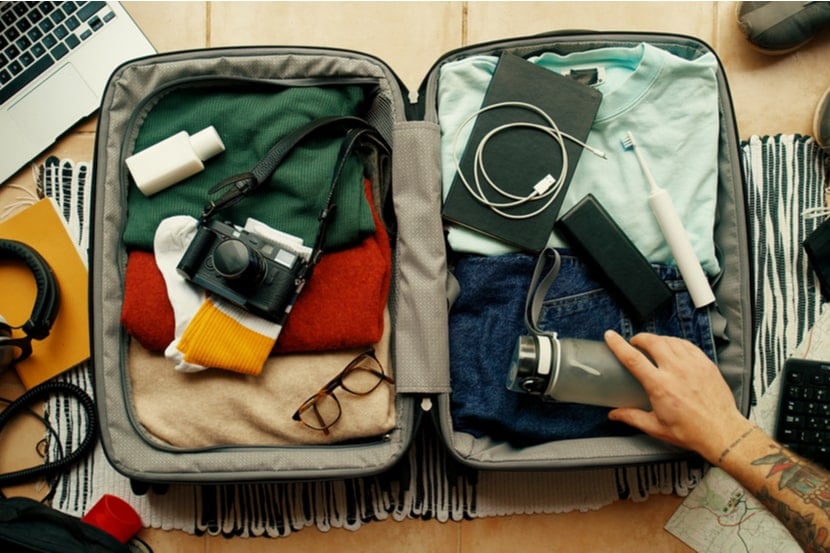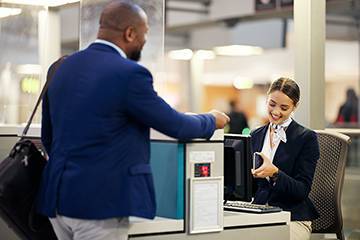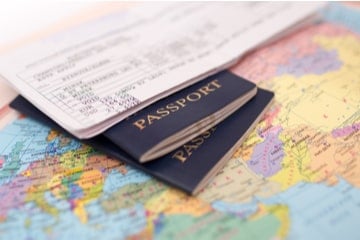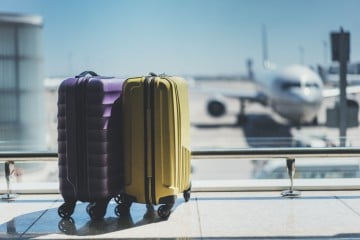Our holiday checklist can remind you of everything you need to take abroad, so you don't need to worry about forgetting anything. Find out what to prepare from essential items to sun cream and maps.

What should be on my holiday checklist?
The most important things to remember are:
- Passport – check the dates carefully and whether the destination needs you to have a certain amount of time left.
- Visas – different countries have different rules and it can depend on your reasons for travelling and length of stay. This government website is a good place to start.
- Boarding passes – some airlines charge you extra for printing at the airport so check the rules.
- Money – make sure you have some emergency foreign currency on you, even if you’re planning to stick to cards while away. This means that you have options if your card fails. If you’ve got a specialist prepaid travel card or a credit card that’s great for use internationally – don’t forget to pack them. Also, check you can use it in the country you're visiting.
- Driving licence – particularly important if you’re planning on driving
- Medication - take more than you need in case of emergencies. It makes sense to split this between hand luggage and suitcases in case one bag goes astray.
- Face masks - still a requirement on some airlines. Check the rules.
- House keys – you don’t want to call a locksmith on your first day back.
- Travel insurance - buy this when you book your holiday so you're covered if something happens, or you need to cancel your trip.
You can get emergency travel documents, such as a passport, if you realise yours is no longer valid. Emergency documents can be expensive, so make sure you check that your passport is valid well in advance of your departure date.
What should I pack for a beach holiday?
Here are the main things to consider:
- Swimwear
- Warm weather clothes
- Clothes for the evening – some hotels have rules on this
- Waterproof bag
- Beach towels
- Hats and sunglasses
- Sun cream and / or block
- Lip salve
- Insect repellent, spray on and plug ins
- Inflatables (unless you’re buying while there)
- Bucket and spade
- Beach friendly shoes (sandals or flip flops)
- Sunshades / umbrellas
- Toys for children
- Goggles
- Fins or a scuba kit
If you’re planning on water sports, don’t forget you might need specialist activity travel insurance in case of any injuries.
What should I pack for a summer holiday?
Your packing list for a summer holiday is likely to be similar to that for a beach holiday. So take all the items from the beach holiday list as well as:
- Push chairs
- Baby food
- SPF 50
- Bite cream
- Baby wipes
- Light clothing
- Sturdy shoes for excursions
- Guidebooks
- Sunglasses and hats for everyone
- Backpack
- First aid kit
- Family friendly games
- Things to distract your children on the flight (including snacks)
- Nappy changing pack
- Favourite toys
- Camera
If it’s a family holiday, don’t forget that everyone needs insurance cover, so it might make sense to look at family travel insurance.
What should I pack for a ski holiday?
Ski holidays can be the hardest to pack for, not least because all the clothes are so bulky and heavy that it’s harder to stick to the weight limits. Some equipment you might have with you, while you might be renting other bits out there.
Here’s the list of must-haves.
- Skiwear (jackets and salopettes)
- Base layers
- Ski socks
- Gloves
- Helmet (increasingly a requirement for winter sports insurance)
- Hats
- Sunglasses and / or goggles
- Sun cream
- Lip salve
- Skis / snowboards, boots and poles (either with you or rented out there)
- Lift pass
- Scarf
- Warm clothes for off the slopes
- Sturdy footwear (e.g. walking boots)
It’s really important you have ski travel insurance before you hit the slopes too just in case you get hurt.
What should I pack for a city break?
For a city break, you should be able to pack lightly as you’re likely to only be away for a short amount of time. Make sure you’ve got everything on this list before you jet off:
- Guidebook
- Map (or maps downloaded on your phone)
- Local taxi app (Uber equivalent)
- GHIC health insurance card if you’re travelling in Europe
- Comfortable walking shoes
- Weather appropriate gear (sunscreen, sunglasses and hat, or hat, scarf, coat and gloves).
- Bag that you can carry for decent distances or that’s safe out at night (e.g. backpack, cross body bag).
- Camera
- Medicines and prescriptions
- Train, plane or bus tickets if you’re travelling within a city
- Water bottle or flask
- Umbrella
Many travellers prefer to go hand luggage only, so they can avoid hanging around in baggage reclaim. If you carry a handbag, check if you’re allowed this and a separate hand luggage bag. Most airlines let you, but some don’t.
What travel documents do I need?
We’ve already mentioned the main ones, which are passports, visas, travel insurance, boarding passes and drivers’ licences.
However, there are other things to consider. If you’re travelling within Europe, you should make sure you take your GHIC card. This is a free document that should get you access to state healthcare in Europe. It’s quick and easy to apply.
It helps to have printouts of the most important booking confirmations. Having multiple copies (one in hand luggage and one in suitcases for example) can be a valuable back up.
Documents to print and take with you:
- Flight details and boarding pass – including your return flight
- Insurance certificate (in some countries, like Cuba, this is a legal requirement and you may be asked to show proof)
- Hotel confirmation
- Any Visa confirmation (for instance your ESTA confirmation if you’re going to America)
- Booking confirmation for any internal travel, excursions or activities
Remember to buy travel insurance
No matter what type of holiday you’re going on, travel insurance helps protect you against cancellations and delays, medical expenses and the costs of any lost or stolen items.
Try to book this as early as possible.This is important as you could claim your money back if the holiday is cancelled. If your airline goes bust or you get an injury that could prevent flying, you should have the option to get your money back.
Think carefully about what kind of activities you’ll be doing and whether you need specialist insurance, ski or extreme sports cover, for instance. Factor in the location too, as not all basic policies cover everywhere in the world.
Don’t just buy the cheapest insurance you can find, either. Often the limits will be low, and you might not have enough cover if something does go wrong.
Compare travel insurance






